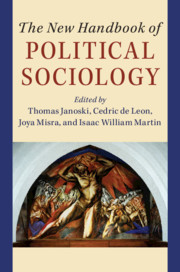Book contents
- The New Handbook of Political Sociology
- The New Handbook of Political Sociology
- Copyright page
- Dedication
- Contents
- Tables
- Figures
- Contributors
- Acknowledgments
- Introduction
- I Theories of Political Sociology
- II Media Explosion, Knowledge as Power, and Demographic Reversals
- III The State and Its Political Organizations
- IV Civil Society: The Roots and Processes of Political Action
- 22 The Challenges of Citizenship in Civil Society
- 23 Social Movements
- 24 Political Parties
- 25 Machine Politics and Clientelism
- 26 The Good, the Bland, and the Ugly
- 27 The Politics of Economic Crisis
- 28 The Influence of Public Opinion and Advocacy on Public Policy
- 29 Nationalism
- V Established and New State Policies and Innovations
- VI Globalization and New and Bigger Sources of Power and Resistance
- Index
- References
27 - The Politics of Economic Crisis
From Voter Retreat to the Rise of New Populisms
from IV - Civil Society: The Roots and Processes of Political Action
Published online by Cambridge University Press: 22 February 2020
- The New Handbook of Political Sociology
- The New Handbook of Political Sociology
- Copyright page
- Dedication
- Contents
- Tables
- Figures
- Contributors
- Acknowledgments
- Introduction
- I Theories of Political Sociology
- II Media Explosion, Knowledge as Power, and Demographic Reversals
- III The State and Its Political Organizations
- IV Civil Society: The Roots and Processes of Political Action
- 22 The Challenges of Citizenship in Civil Society
- 23 Social Movements
- 24 Political Parties
- 25 Machine Politics and Clientelism
- 26 The Good, the Bland, and the Ugly
- 27 The Politics of Economic Crisis
- 28 The Influence of Public Opinion and Advocacy on Public Policy
- 29 Nationalism
- V Established and New State Policies and Innovations
- VI Globalization and New and Bigger Sources of Power and Resistance
- Index
- References
Summary
Throughout its history, Europe has gone through various phases of economic downturn. A major one, known as the Great Recession, started out in 2008, first as a financial crisis and then as one of the deepest – if not the deepest – economic crises European countries have had to face so far. Europeans are still struggling with its negative effects. As citizens try to cope with such negative effects in their everyday lives, economic crises also have political effects. At the most basic level, two possible reactions may be mentioned. On the one hand, economic hardship may lead to a decline in political participation and civic engagement as the experience of economic difficulty can certainly be understood as draining resources from political participation.
- Type
- Chapter
- Information
- The New Handbook of Political Sociology , pp. 715 - 737Publisher: Cambridge University PressPrint publication year: 2020
References
- 1
- Cited by

